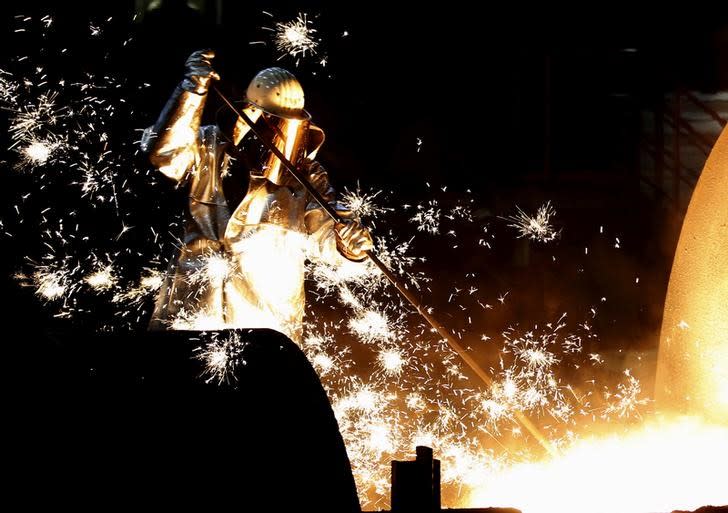German industry output rises less than expected in October

By Michael Nienaber
BERLIN (Reuters) - German industrial production rose less than expected in October due to stagnating factory output and falling energy activity, suggesting Europe's biggest economy started the fourth quarter on a weak footing.
The surprisingly feeble data, published by the Economy Ministry on Wednesday, dampened hopes that the German economy is set for a strong rebound after its quarterly growth pace halved to 0.2 percent over the summer months.
Industrial output edged up by 0.3 percent in October on the month, the data showed, undershooting the consensus forecast in a Reuters poll for a rise of 0.8 percent.
The slight increase was driven by a 1.7 percent jump in construction output, the strongest monthly gain since February. But manufacturing production was almost flat, edging up only 0.1 percent, and energy output fell 0.5 percent.
"Overall, industrial production had a subdued start to the fourth quarter," the Economy Ministry said in a statement, adding that the recent strong rise in industrial orders had yet to result in stronger output.
Data released on Tuesday showed industrial orders rose at their fastest pace for more than two years in October, boosting expectations that the industrial sector will prop up German growth in the coming months.
"Together with the slightly improved global economy and the brighter sentiment indicators, this points to a certain revival in industry in coming months," the ministry said.
Commerzbank economist Ralph Solveen said the industrial output figure for October was not that bad after all, adding production would further increase in the coming months.
"Industry will show a decent performance in the fourth quarter," Solveen said.
ING-Diba economist Carsten Brzeski said an acceleration of the entire German economy in the final quarter still seemed realistic, but new risks were already looming.
"Particularly the uncertainty surrounding the future path of economic policies in the U.S. could weigh on the industry in the months ahead," Brzeski said.
The United States is Germany's single most important trading partner and the protectionist rhetoric of President-elect Donald Trump has unnerved many exporters in the euro zone.
The German government expects strong private consumption and higher state spending to propel growth of 1.8 percent in 2016, the strongest rate in five years.
For 2017, it predicts a slowdown to 1.4 percent due to weaker exports and fewer workdays.
(Reporting by Michael Nienaber; Editing by Madeline Chambers and Ralph Boulton)

 Yahoo Finance
Yahoo Finance 